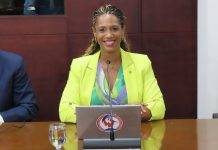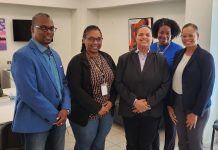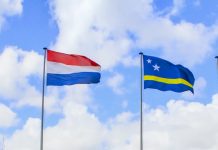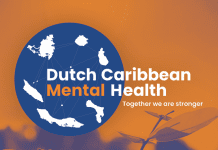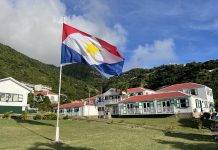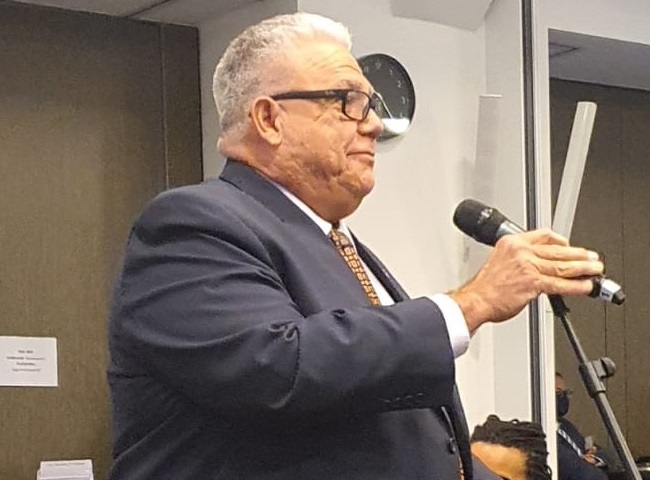THE NETHERLANDS — On Thursday, December 9, 2021, the “ Ten Years after the dissolution of the Netherlands Antilles” Congress and Trade Mission, continued at the Nieuwspoort in The Hague.
On Thursday the Congress opened with a presentation by Ms. Gerlien Croes, Member of the Parliament of Aruba, who discussed the strengthening of our Kingdom relations based on European values and standards. She mentioned that we are small islands with big challenges and explained that change requires support and that the EU offers an alternative, known as the next EU generation.
During her presentation it was questioned why we do not make use of the possibilities that are already offered based on our OCT status and look at a new status which does not have to be a UPG status, but a yet to be determined OCT plus. MP Gerlien Croes made it clear that the way forward was not with reforms by means of liquidity support. We should not subject ourselves to only Dutch Financing when European Financing offers many different possibilities. And the usage of the Caribbean ACP’s for European aid is also possible, perhaps through a working relationship with Caricom.
After Ms. Croes’ presentation, we received a blistering reality check from Mr. Koos Sneek, Island Council Member of St. Eustatius, as to what the Public Entity St. Eustatius was going through. Mr. Sneek gave an in depth view of the small-scale reality of Sint Eustatius and current day situations and experiences of Sint Eustatius. He discussed the intervention that started in February 2018 and different events that have taken place since, are still taking place, and will continue for the next few years. “To be a BES island is the worst choice any country in the kingdom can make.” was his advice to all present. An advice we should all truly heed. In his eyes the citizens of St. Eustatius are 2nd class Dutch citizens and getting equal treatment isn’t automatic. The social welfare debacle is a great example of such. Many agreements were made when the Dutch government intervened, but, very often, the agreements from the Netherlands’ side were not lived up to. A known behavior pattern most of us agreed to know and understand well.
The next presentation was given by Mr. Amerigo Thode, Member of the Parliament of Curacao, who focused on the debt problem. Mr. Thode looked at the conditioning of financial support from the Kingdom, the exploration of refinancing options and the recent advices of the IMF. The true functioning of the CFT since 2017 was questionable as the BBP has since gone backwards. For the past 10 years the country has gotten poorer and the average income of the Curacao inhabitants reflected in the BBP decreased from 35.000 guilders to the present 25.000 guilders. Curacao continues to go downhill and in their opinion the CFT doctrine is to keep Curacao firmly in hands of the Dutch government by keeping the inhabitants poor. Why a consensus law is required for the COHO was questioned as everything is presently working well already.
Mr. Aubrich Bakhuis spoke about the challenges for good corporate governance in public entities and foundations in the Caribbean parts of the Kingdom of the Netherlands. Mr. Bakhuis looked at how we can go from good governance to excellent governance and the challenges that come with such an endeavor. He also presented a Road Map to excellent corporate governance in the semi-public sector.

Mr. Raymond Gradus, the Chairman of the CFT discussed the Ten Years of financial supervision. Mr. Gradus illustrated some points that can help improve effectiveness, such as introducing financial management as a norm, and an enforceable information obligation for government entities. He concluded that financial management and budget management were not in order before the Corona-crisis, that the crisis has further accentuated the underlying issues, that stringent fiscal policies must go hand in hand with economic reforms, and that for effective supervision the current toolbox could be expanded. When asked why he doesn’t support the islands and ensure that they receive debt cancellation it became clear that Mr. Gradus does not believe that should happen. When asked if their/his advice is supporting the countries to get their financial houses in order or if they are creating intentional stumbling blocks, Mr. Gradus did not answer. Something that Curacao representatives called a doctrine. Lastly, when questioned about extending more loans to the countries, while they are already over their heads with loans, Mr. Gradus recommended that the islands should make use of the opportunity being granted.
Prof. Mr. G. Oostindie gave a presentation titled: Kingdom Relations; what does history teach us about limitations, challenges and opportunities. Prof. Oostindie mentioned opportunities based on realism, integrity, involvement, and permanent learning ability. Prof. Oostindie made it very clear that part of our kingdom history is soaked with violence, racism and slavery and we should not push that aside when trying to understand each other. Our fight is actually about equality and respect, two things that we very often cannot find in our discussions. What was also interesting was his remark that the charter is not written in stone and is full of fictions and shortcomings, and the charter will only change when the Netherlands decides to change it. Another statement that caught the attention of many, was that by BZK too often the motto towards the Kingdom relations is simply put “Minimizing contingency liability”.
The use of Consensus Kingdom Laws is basically a new manner to Recolonize the autonomous countries, by always having a say in everything that happens and how it happens. This started back in 1990 when the Antilles denied independence. A great history lesson was presented and also a stern warning was given that “we must understand that at the moment we do not have the required capacity and money to execute many things”. He questioned if the island’s autonomy is helping the people? Or only the politicians? A clear view of our integrity and our bad education system was given to show why we find ourselves in the situations we are in.
Mr. Ewout Irrgang, Member of the General Audit Chamber of the Netherlands, questioned in his presentation if The Netherlands, as the largest country in the Kingdom, takes sufficient account of the small scale of the Caribbean parts of the Kingdom. Interesting was the relatively small amount of about 0.05 to 0.1 % of the Kingdom budget that is used in the islands’ while the total budget is about 350 billion euro in 2022. The accountant shortage that the Netherlands is suffering will eventually affect the islands when it pertains to having the need for accountants. Also it was remarkable how in the Netherlands the division of work is totally different; In the Netherlands about 10 civil servants handle a dossier while in the islands it is 10 dossiers to one civil servant. This is also why they share their capacity when asked via zoom mostly to assist their other colleagues in the other country’s audit chambers.
The final presentation was a duo-presentation by Ms. Jorien Wuite, Member of the Second Chamber of the Netherlands, and Ms. Daphina Misiedjan an associate professor at the Erasmus University, which zoomed in on the climate treaties and the Caribbean part of the Kingdom of the Netherlands. This presentation looked at the needs for having the climate treaties also count for the Caribbean parts of the Kingdom and how best to deal with this. Seeing the Caribbean countries of the Kingdom are not signatories to the Kyoto or Paris accord, the approach needs careful review and cost analysis.
The Congress concluded with a panel discussion on the topic of climate change within the Kingdom in which Member of Parliament Claudius A. Buncamper, along with Members of Parliament of Aruba, Curacao and the Netherlands, and academics participated. During the debate the main question was if climate change should become a Kingdom affair. MP Buncamper believes that as long it does not come with conditions or costs, taking our present financial situation into account, the country should not have an objection to be part of the climate change program from the Kingdom.

